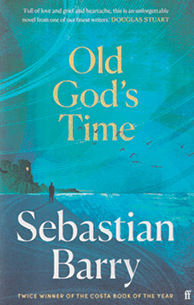On This Day in Irish History: Old God’s Time
- John O'Brien
- May 29, 2023
- Edited 6 months ago
Table of Contents

By Sebastian Barry
Faber & Faber Ltd. ISBN 978-0-571-33278-6 2023 261 pp Review by Terrence Kenneally
Old God’s Time is the sixth work of fiction this column has reviewed of Barry’s work. Among others was The Secret Scripture, shortlisted for the Man Booker Prize. His novels have twice won the Costa Book of the Year award. Sebastian Barry was born in Dublin in 1955. In 2018-21 he was the Laureate for Irish Fiction.
Barry’s protagonist is Tom Kettle, a retired policeman living alone in a coastal Dublin suburb during the mid-nineteen nineties. As we slowly come to learn, Kettle spent his childhood in an orphanage where the boys were serially raped by the Christian Brothers who ran the place, or in Kettles understandably squishmish poeticism, “put to the sword of their lust.” Such institutions were full of children of “fallen” women from whom they were often separated at birth. The mothers (Kettle never knew this) would be confined to the so-called Magdalen asylums where they provided free labor for the local communities.

Old God’s Time shows how Kettle made a narrow escape from this state-sanctioned hell into the blessed normality of middle-class life. As a police officer, Kettle was forced into complicity with the system that brutalized him. “Girls fleeing from laundries, children fleeing from orphanages, all had to be returned, “ he recalls of his days on the force.
There was no law dictating this, it was just how things had to be done in a Catholic nation that valued social “harmony” above individual rights. This state of affairs persisted until the nineteen-nineties when the Church began to lose its theocratic grip on the state.
At the start of the novel, Kettle’s solitary existence is disturbed by an unannounced visit from two former colleagues who want to know what he can tell them about an unsolved case he worked on in the 1960s, involving two priests accused of sexually assaulting children. One of the pair was murdered and the killer has never been found.
Such an opening seems to prime the reader for a piece of high-end genre work, but the book turns out to be much more than that. In the years before the novel opens, Kettle has lost his wife and two adult children to a sequence of tragedies. In the case of his wife, we learn she was raised in an orphanage where the murdered priest was the headmaster who raped her repeatedly from the age of six until she was able to escape at the age of twelve.
At the time of the murder DNA evidence was not available, but more recently blood found at the scene was determined to belong to someone other than the priest. The two former colleagues want to ask Kettle to submit to a blood test to rule him out as a potential suspect because they were aware his former wife was a victim of the repeated rapes.
The story has a surprising twist at the end and is filled with other diversionary facts which make this book a TOP SHELF read.
Other iIrish Recommended Stories:
- This Just In: MICHIGAN IRISH AMERICAN HALL OF FAME NAMES 2024 MEMBERS
- This Just In: Pittsburgh Day of Irish Entertainment is Coming
- This Just In: A week is still a long time in politics
- This Just In: Recognition of Palestinian Statehood an important step for the Palestinian people – Mary Lou McDonald TD
- This Just In: Update on Bringing National Women’s Soccer League to Cleveland

*Terrence J. Kenneally is an attorney and owner of Terrence J. Kenneally & Assoc. in Rocky River, Ohio. He represents insureds and insurance companies in insurance defense through the state of Ohio. Mr. Kenneally received his Masters from John Carroll University in Irish Studies and teaches Irish Literature and History at Holy Name High School.





